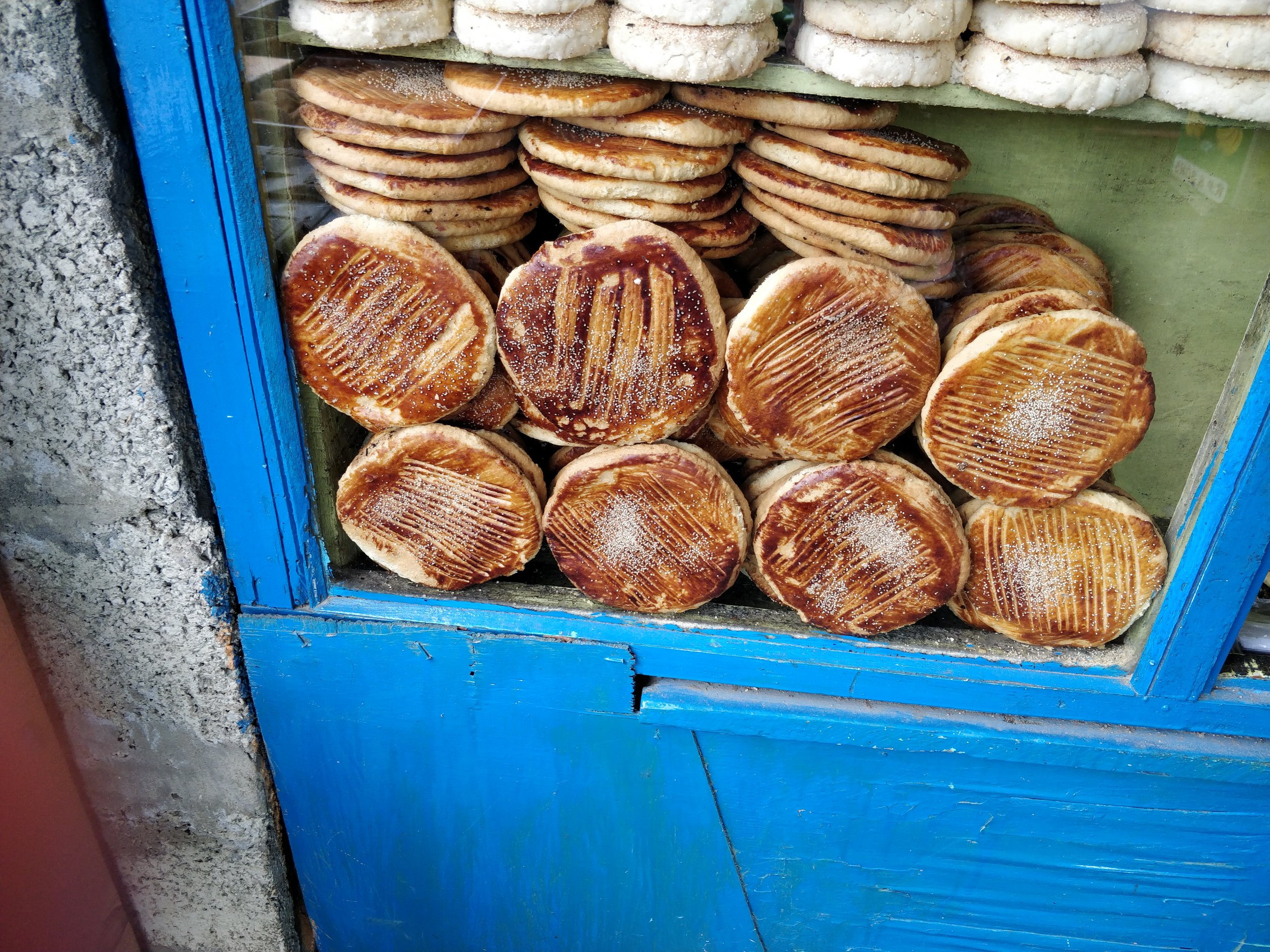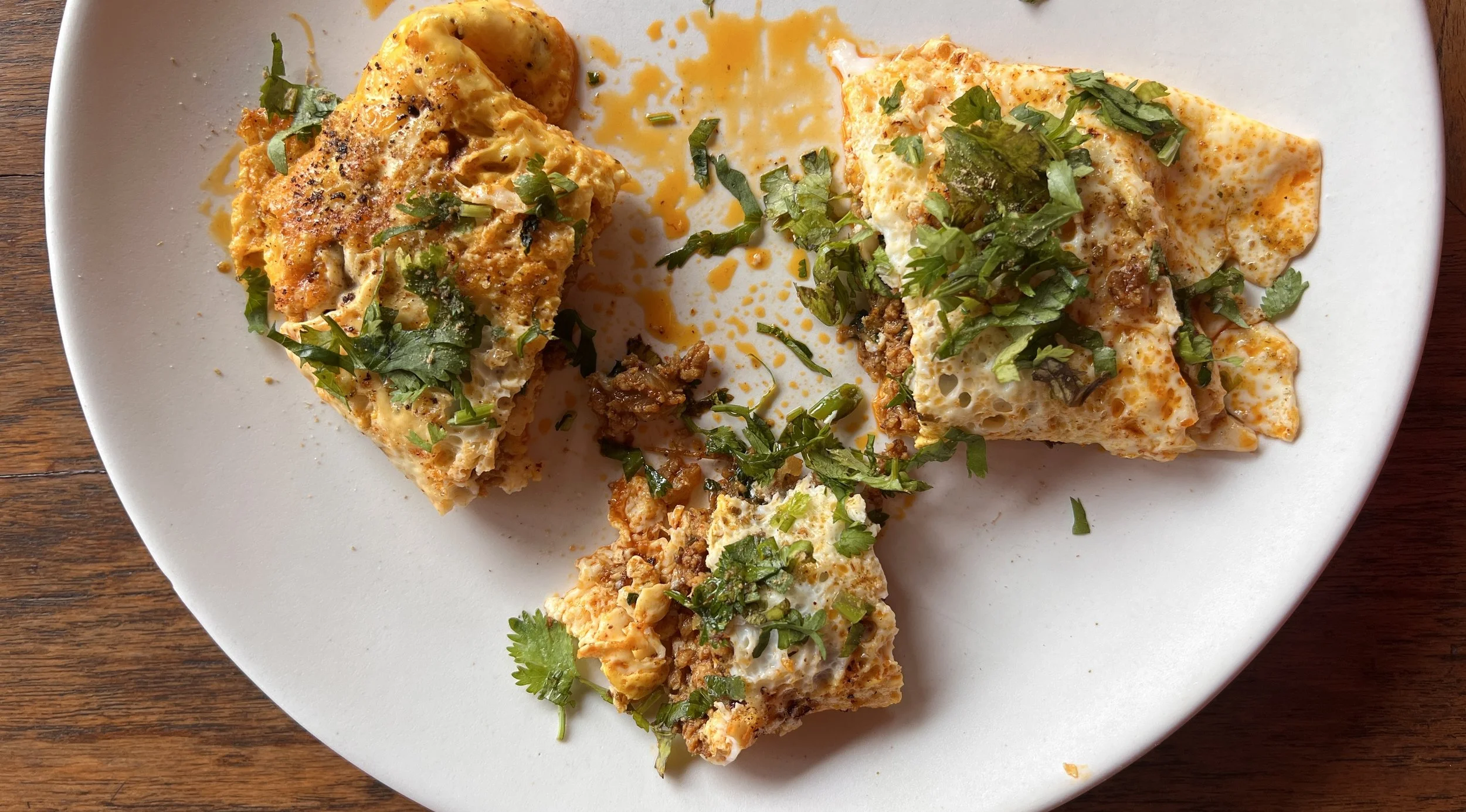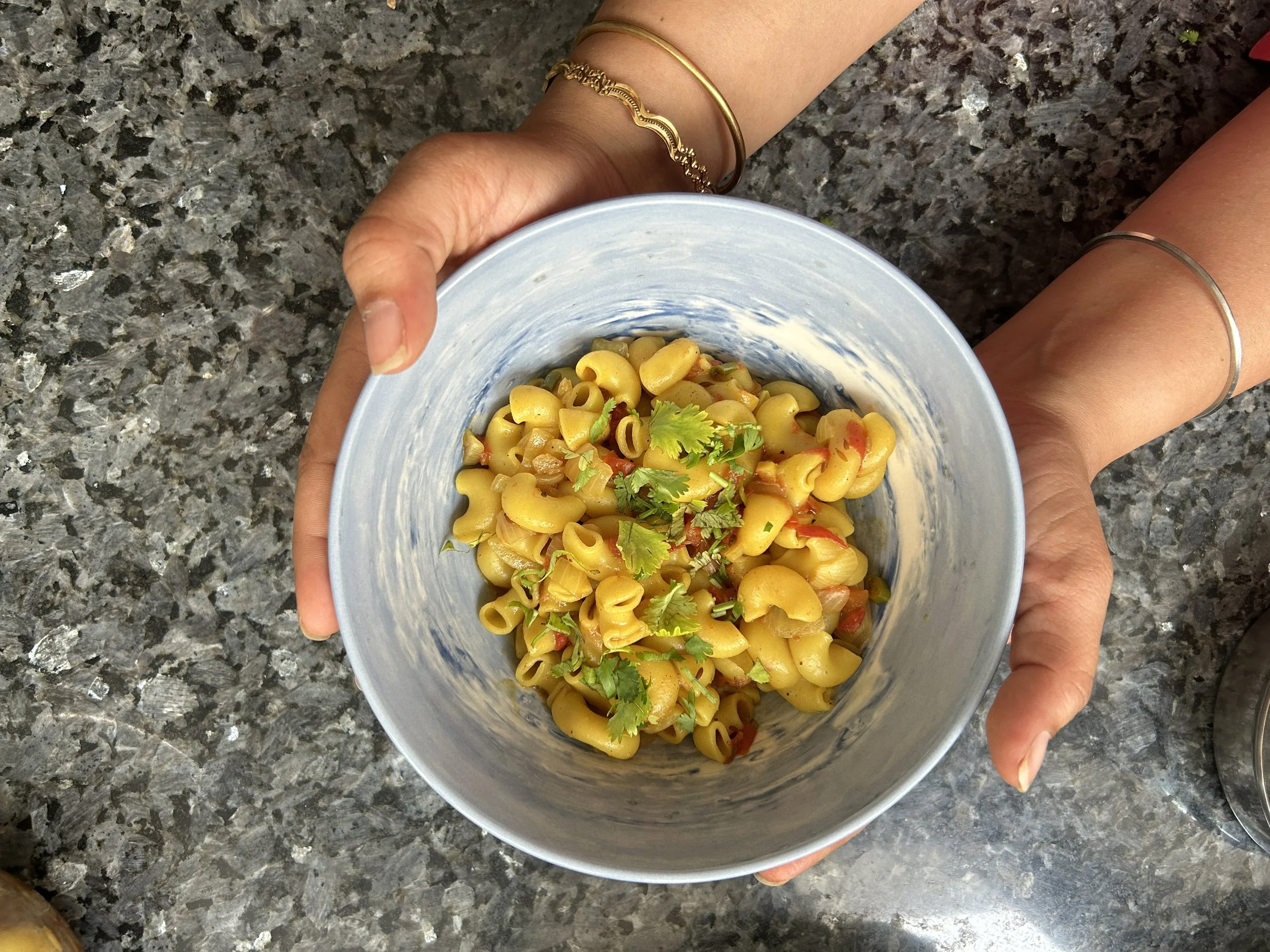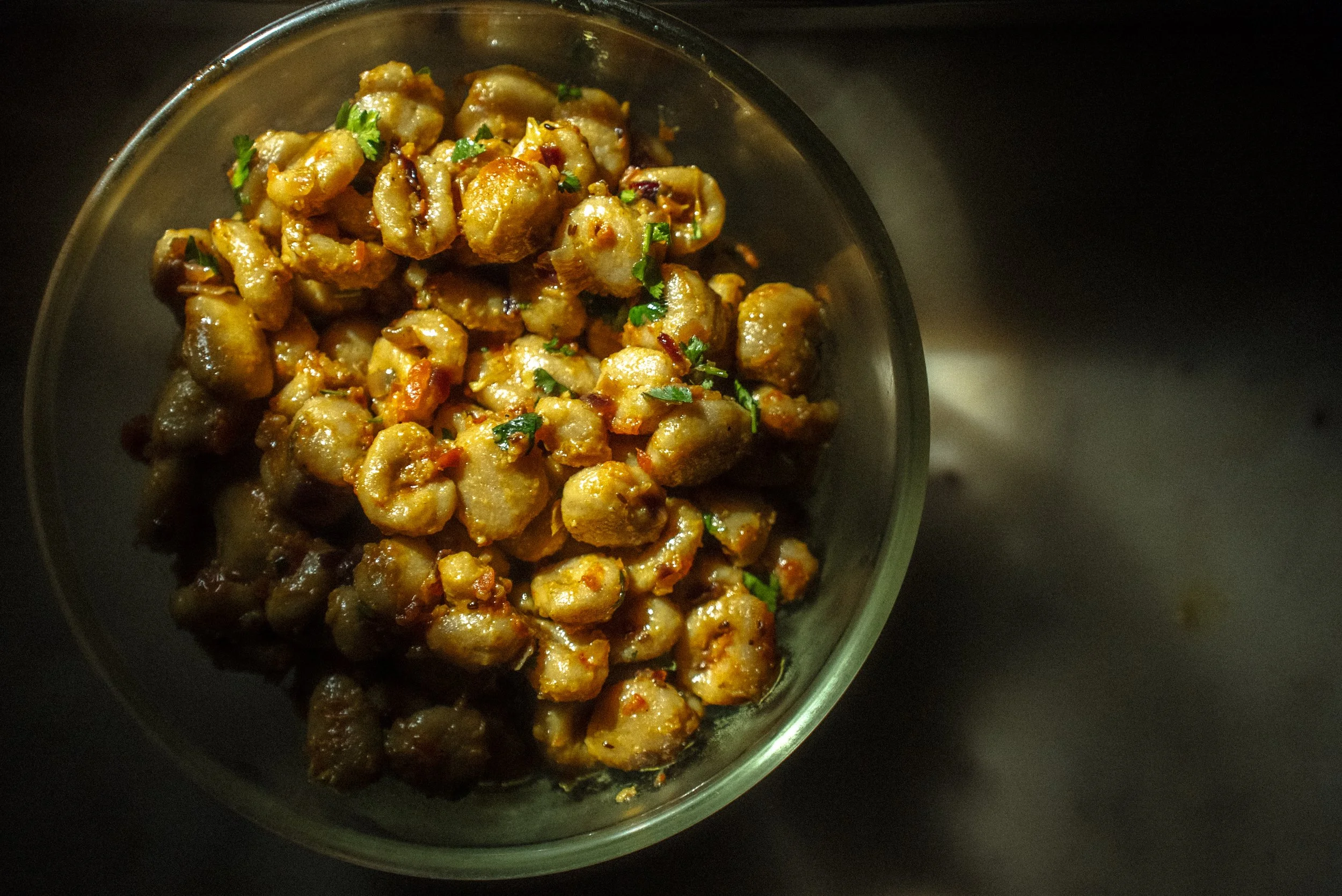A Kashmiri Romance With Bread

Through the changing landscape of Kashmir, one thing has remained constant — the Kashmiri love affair with freshly baked bread. Mehk Chakraborty learns the rules of engagement, sharing tea and bread with the locals.
I have always loved bakeries. In Kashmir, when I chanced upon the region’s unique tradition of baking, I was eager to know more. I sampled a few breads in the name of research, and quickly found that their repertoire of breads runs as deep as their love for baking. Breakfast breads like czot are golden, doughy and slightly chewy, loaded with butter; all-day breads, like the fluffy, soft, doughnut-ty bread czochworu, are sprinkled with poppy and sesame seeds; sweet breads like the crumbly and round kulchas come in flavours like pistachio and coconut. And very often, these categories intersect, making for a strange and wonderful assortment of flavours.
Most breads, like the kulchas, are cooked in a traditional oven. But breads like the czot and the puffy, flaky bread baikarkhani are cooked in fire-wood tandoors. And the flatbreads, like the haath ki roti are cooked over gas stoves. And all Kashmiri breads, with the exception of sweet breads, contain poppy and sesame seeds, and are baked with processed flour.
Image credit Kashmirfoodgram
But these delicious Kashmiri breads caught my attention for several other reasons too. Despite the steady march of globalisation, it was fascinating to see how the bakeries kept the culture of bread, and slow living in the Valley strong. There are French bakeries and hip cafes opening up in cities like Srinagar, but the neighbourhood bakery or kandur still retains a strong foothold in the community.
Wandering through the streets of Srinagar or Pulwama, finding yourself at a traditional bakery is inevitable. These bakeries date back a few decades, and in some cases, a century or two. Mohammed Khalil Sheikh’s 120-year old bakery greets patrons with the smell of freshly baked bread. Situated in a dimly lit and modestly decorated store on the ground floor of a residential building, the establishment began with selling rotis, but eventually, on popular demand, began selling several baked goods including traditional breads.
“Our place has always been a family-run establishment. It has been around for so long that everyone in the neighbourhood recognises my family and we are very well-connected with the community,” said Sheikh’s daughter who works the bakery counter. Their kandur has become a place to catch up with friends, and the establishment is used to regulars.
Kamran Nisar, co-founder of Winterfell Café, a popular establishment by the Dal Lake in Srinagar, has strong memories of his neighbourhood bakery. “The Shahwal baker, very close to my home - we would visit very often as children, and eat their perfectly crisp lavasa,” he recalls. Lavasa, a large, thin, processed-flour flatbread can be eaten on its own, but is also used as a wrap. Though Nisar doesn’t visit his baker as regularly as he used to, he still holds on to those memories as central to his childhood.
Some while ago, when I travelled to the scenic Gurez Valley, by the border of India and Pakistan, Zeenat Lone, a middle-aged woman in Gurez, invited us to her home for tea, like Kashmiris do. “You must taste some haath-ki roti. Dip it into the tea and eat it,” she instructed.
Zeenat ammi had made the dough for the haath-ki roti herself, flattening it into shape with the palm of her hand. Made with maida over a stove, it is a large, round bread that can be torn into pieces just like paper, and is a lovely accompaniment to tea. Zeenat ammi also shared with us her love for local bakery products. Cakes were important to her, but evidently not as much as breads. “Have you tried the kulchas, the hard, round and small breads? Here, taste the sweet one as well as the savoury one,” she offered, enthusiastically. I particularly enjoyed the traditional flavour of a savoury kulcha, sprinkled liberally with poppy seeds. It felt like the perfect alternative to a store-bought cookie. The kulcha crumbled almost instantly, when I dipped it into my tea, soaking in all the flavours. The sweet kulcha was undoubtedly delicious too, buttery and flavoured with pistachio.
Image credit Kashmirfoodgram
Gurez Valley faces isolation for over four months in winter, and essential supplies like gas have no way of reaching inhabitants. Electricity is scarce here. Other parts of Kashmir are also prone to being cut off, for several reasons, but primarily owing to the conflict that the area has been facing the past few decades.
“Breads play an important role in Kashmiri society, and there are strict rules to be followed in their consumption, particularly when accompanied by tea.”
In such situations, these humble breads serve as emergency supplies. People like Zeenat ammi stock up on kulchas and the dry, crumbly bread known as shirmal, that can be stretched to last several months. I found a box full of haath ki roti flatbread in our guide Zaffar bhai’s house in Gurez which, besides serving as an emergency snack that can be quickly be offered to hungry visitors and passers-by, act as full meals when gas, electricity or access to the outside world are unavailable.
Breads play an important role in Kashmiri society, but as I found out, there are strict rules to be followed in their consumption, particularly when accompanied by tea. As teas have widely varying tastes and textures, the breads they are paired with differ as well. The two types of teas that are most popular in Kashmir are kehwa (an aromatic green tea) and nun chai (salted tea).
The kehwa, consumed on special occasions, with ingredients such as saffron, cinnamon and cardamom, has a sweet, subtle taste and pairs well with lighter breads. The nun chai contains milk, butter and salt, and is a creamy beverage that pairs well with thicker breads. For example, czochworu and kulchas are consumed with nun chai, and shirmal and the puffy bread bakirkhani are served with kehwa.
When I asked Nisar about chai and breads, he explained that bread is an important part of life for the average Kashmiri. “The first thing we have in the morning is the flatbread czot with tea. Following this, through the day, there are numerous czochworu consumed by dipping into nun chai,” he says. Over the course of the day, Kashmiris reach for a bread-snack accompanied with tea, despite the growing presence of multi-cuisine and fancy restaurants coming in, even in Srinagar where a changing cultural landscape is becoming evident. This is not to say that tastes do not change with time and evolve. But for now, however, if the aromatic winds passing by the lanes next to kandurs signify anything, it is that Kashmiris will be breaking bread for years to come.
Mehk Chakraborty is a multimedia journalist and writer who loves to explore the arts, cultures and places. She has an educational background in Political Science and International Relations but her interests include poetry, yoga, philosophy and cats.
ALSO ON THE GOYA JOURNAL









